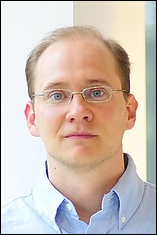News Story
Katz Named Director of Maryland Cybersecurity Center

Dr. Jonathan Katz, Director MC2
Thu Oct 24, 2013
From UMIACS News Article
A noted University of Maryland expert in cryptography and information security will now lead one of the nation’s preeminent centers dedicated to cybersecurity research and education.
Jonathan Katz, professor of computer science, was appointed to a three-year term as director of the Maryland Cybersecurity Center (MC2) effective October 24, 2013.
He will provide leadership to the unique center that joins computer scientists and engineers with researchers from across campus in fields such as economics, supply-chain management and the social sciences.
"The threats and challenges in cybersecurity continue to grow exponentially. We intend to respond in-kind using innovative research and education," says Patrick O'Shea, UMD's vice president and chief research officer. "Jonathan Katz is the perfect candidate to lead these efforts."
MC2 was launched in 2010 with strong support from the A. James Clark School of Engineering and the College of Computer, Mathematical, and Natural Sciences (CMNS). Since then, the center has fostered numerous collaborations in cyber-related research, education and technology development with major corporations that include ManTech, Tenable, Lockheed Martin and Northrop Grumman.
"I look forward to working with our students, faculty and external partners to help prepare the future cybersecurity work force and to develop new technologies to defend against cyber attacks," says Katz, who brings more than a decade of experience in research and education to his leadership role at MC2.
Katz joined the faculty of the University of Maryland in 2002, having previously worked as a research scientist at Telcordia Technologies (now Applied Communications Research). He has held visiting positions at the University of California, Los Angeles, the IBM T.J. Watson Research Center in New York, and the École Normale Supérieure in Paris.
"I look forward to working with our students, faculty and external partners to help prepare the future cybersecurity work force and to develop new technologies to defend against cyber attacks,"
Jonathan Katz
Katz has published more than 100 scientific articles and two books, including a widely used undergraduate textbook on cryptography. He has also done extensive consulting work for U.S. government agencies and private corporations, mostly involving cryptographic protocols and algorithms.
"The university's cybersecurity vision is to integrate our efforts with government and private industry," says Jayanth Banavar, dean of CMNS. "Jonathan has firsthand knowledge in that area, making him invaluable."
Katz earned his doctoral degree in computer science from Columbia University. He holds undergraduate degrees in mathematics and chemistry from the Massachusetts Institute of Technology.
Katz succeeds outgoing director Michael Hicks, who will remain at MC2 and continue his work in software reliability and security.
Hicks leaves the center in excellent shape: MC2 just unveiled a new collaborative workspace in the A.V. Williams Building and has hired four new cybersecurity faculty in the past two years; one in computer science and three in electrical and computer engineering.
"The university, the state of Maryland and the federal government all consider increased cybersecurity vigilance, research and training to be paramount. We know this is a worthwhile investment and I am confident that Jonathan Katz will move our center forward," says Darryll Pines, dean of the Clark School.
The four new cybersecurity faculty members, as well as Katz and Hicks, all have appointments in the University of Maryland Institute for Advanced Computer Studies (UMIACS), which oversees MC2.
"UMIACS has long served as a catalyst for the very best in interdisciplinary research related to computer science," says Amitabh Varshney, director of UMIACS. "Michael Hicks has done an outstanding job as the first director of MC2, and I know that Jonathan Katz has the passion, vision and leadership skills to build upon that work and take the cybersecurity center to the next level."
Published October 25, 2013









